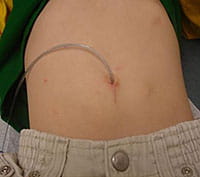What is a Malone Appendicostomy?

The Malone procedure is a choice for patients with fecal incontinence (leaking stool) and constipation that are:
- Able to clean out their bowels with a rectal enema each day
- No withholding or retaining issues.
- Able to wear normal underwear
- Ready to manage more of their care independently
Preparing for Surgery
- Your child’s bowel may need to be cleared of stool before the surgery. Your doctor will give you bowel clean-out instructions for your child.
- Same day surgery will call you 24-48 hours (1-2 days) prior to the surgery date. They will discuss:
- Rules about eating and drinking to prepare for surgery
- Which hospital location to be at for the surgery
- When you need to arrive at the hospital
- Talk with the doctor if your child takes any medicine. Do not give your child any medicine on the morning of surgery unless your child’s doctor tells you to.
- On the day of surgery, your child will have an exam by the health care team to make sure your child is ready for surgery.
During Surgery
The surgery takes about two hours. Your child will be asleep during this time. The doctor will take the appendix and bring it up to the belly button. From there, the surgeon attaches it to the skin at the belly button. A one-way valve is made out of your child’s own tissue. This helps to keep stool from coming out of the small opening made in the belly.
Prior to the surgery, the surgeon will have a discussion with you and your child to decide on the tube that is left in the new Malone site. Majority of patients will come out with a tube stitched in place. The surgeon will remove the stitches later in clinic and teach self-catheterization. Some patients will want to have a miniace or chait tube in place instead of self accessing. The surgeon can either place those devices at the time of surgery or in clinic later.
After Surgery
- Your child will stay in the hospital for about two days after surgery. Your child’s nurse will show you how to give the enema through the Malone before you leave the hospital.
- The Malone tube will stay inside the belly button for one month after surgery to allow for healing.
- During this time, some drainage from the belly button is normal.
- Your child’s nurse will show you how to give the enema through the Malone before you go home.
- Your child must not do any heavy physical activity (such as: gym class, sports) for one month after surgery.
To Prepare for your Post-Op Appointment
- You will need to come back for a clinic visit one month after surgery to have the Malone tube taken out if a catheter is left in place after surgery.
- During this visit, the doctor will teach you and/or your child how to put the tube back in, on your own, when you need to do the bowel flushes.
- If your child decides later after surgery they would rather have a miniace or chait tube instead of self-accessing, your surgeon can size and place one in the office. Those devices have to be changed every six months. The miniace can be changed at home after education from the provider. The chait tube has to be changed by the surgeon.
- An ACE Stopper will be put into the Malone opening if the patient is self-accessing. The purpose of the ACE Stopper is to keep the opening from getting narrow and / or to keep it from leaking. This stopper must be worn for six months at night time during sleep. It can be taken out during the day.
When to Call the Doctor
Call your child’s doctor if:
- You are having trouble putting the tube into the Malone.
- If there is a change in leakage of fluid from the Malone.
- Leaking still happens after you take out the Malone tube.
- Your child is having stool accidents between Malone flushes.
- Fever (temp over 100.4F).
- Pain with the flush
Call the Colorectal Center at 513-636-3240 if you notice any of these issues or if you have any questions or concerns.



